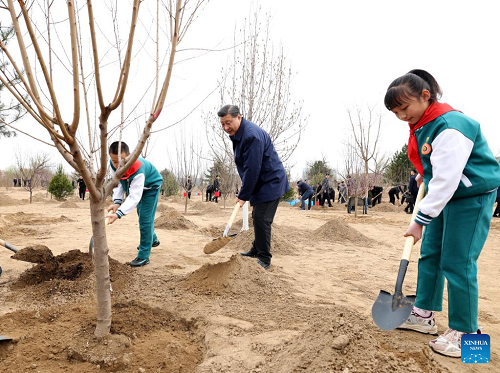 Du 19 au 22 avril le European Consortium for Political Research accueille – à l’Université d’Edimbourgh et en ligne – plus de 400 chercheuses et chercheurs à l’occasion de ses Joint sessions of workshops. Invitée dans le cadre de l’atelier «Marketing authoritarian practices at home and abroad», notre lauréate Virginie Arantes y présente une communication intitulée « When environmental and authoritarian discourses collide: marketing green nationalism in China ».
Du 19 au 22 avril le European Consortium for Political Research accueille – à l’Université d’Edimbourgh et en ligne – plus de 400 chercheuses et chercheurs à l’occasion de ses Joint sessions of workshops. Invitée dans le cadre de l’atelier «Marketing authoritarian practices at home and abroad», notre lauréate Virginie Arantes y présente une communication intitulée « When environmental and authoritarian discourses collide: marketing green nationalism in China ».
Abstract

Le Président chinois Xi Jinping plante un arbre dans le district de Daxing, à Pékin, 30 mars 2022 (Xinhua/Huang Jingwen).
In the battle for global legitimacy, the Chinese Communist Party (CCP) has learned to take advantage of the public consensus regarding the need to be more environmentally sustainable. The “ecological civilisation” rhetoric—which integrates environmental protection in the nation’s authoritarian political system—has become a key political slogan nationally and abroad. This state-led “sinicised” version of environmentalism frees the regime from the trajectory of Western societies and function as a charm offensive to the failures of slow-paced and plural decision-making processes under liberal-democracies. This paper takes green nationalism as its main theoretical focus to contribute to theory-building by conceptualising green nationalism in China’s authoritarian context. Building on ethnographic observations in Shanghai, a Metropole aspiring to put China at the top of the list of the world’s most sustainable cities, and qualitative analysis of Chinese leaders’ discourses, it proposes a more nuanced and contextual understanding of how China’s authoritarian regime mine environmental discourses to enhance its legitimacy at national and international levels. Drawing on constructivist political theory that views nationalism as an everyday performance, the paper introduces novel ways to understand the implications of the instrumentalization of the environmental sphere by China’s authoritarian regime. A close study of discourses and actions will (1) provide stronger clues into formulations of green nationalism and (2) highlight the different ways in which the internationally ascribed obligations and norms of climate change are appropriated, calibrated, and legitimated to forge national identity, national interests and claims to legitimacy in authoritarian settings.
Virginie Arantes interviendra également à la conférence « Future Practices of Citizenship in Asia and the West. The Care of the Self III », organisée du 25 au 29 avril par l’International Institute for Asian Studies. Elle y présentera une communication intitulée « ‘Green’ Citizenship and the Depoliticization of Environmental Governance in Urban China ».
Docteure en Sciences politiques et sociales (ULB), Virginie Arantes a reçu un subside postdoctoral pour entreprendre des recherches sur le thème « Vers une gouvernance ‘collaborative’ efficace ? Un regard comparatif sur le rôle des ONG environnementales en Chine et à Taiwan », auprès de la Prof. Anna Lora-Wainwright (Oxford School of Global and Area Studies).


